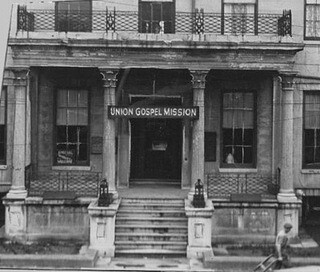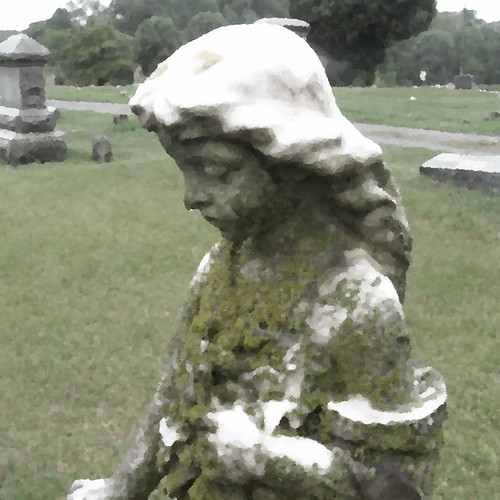I discovered some interesting new (to me) historical information this week that I thought I'd pass on for any who are interested.
As you may or may not know, that song was written by two Louisvillians – sisters Mildred and Patty Smith Hill. In fact, right down the street from Iroquois Park - near where I grew up in Louisville's south end - you can see an historical marker commemorating the Hill home in that neighborhood and their celebrity for writing “the single most recognized song in the English language” (according to the Guiness World Records people).
The sisters are buried together in Cave Hill cemetery just a few blocks from my church, in east downtown Louisville.
All of that, I already knew: That the Hill sisters were from Louisville, that they were school teachers and that they wrote this famous song. Here's the new information I learned...
Patty Smith Hill and her sister grew up in Louisville in the mid-1800s and, encouraged by her parents and contrary to cultural norms, she pursued advanced education and became quite a scholar in the field of early childhood education. One source I read this week called her THE leader in progressive early childhood education at the turn of the century.
When she was first starting out, she taught at Sunday School classes and developed an interest in what was called “the Kindergarten Movement.” Prior to the mid-1800s, kindergartens did not exist in our country and there was a movement to begin serious and organized efforts at educating our youngest children through these kindergartens (which, themselves, started in Germany, as you may know).
So, as it happens, when the people of the Union Gospel Mission – the church from which my current church grew out of – were meeting together in the 1880s, they saw a need in the downtown Louisville area, the need for early childhood education for the poor and immigrant children in the area.
And I don't know how it all came together exactly, but the end result of this meeting together of concerned church folk (and others?) in downtown Louisville, is that Patty Smith Hill ended up being the first head teacher of the first on-going “experimental kindergarten” in Louisville, an effort that not only aided the poor and immigrant children back then, but continued to lead to great advances in early childhood education and inform education the world over.
I'm always interested in any kind of history, but especially "small" and "local" history - the sort not typically written by historians. But I also find it interesting when the "small, local" histories of our parents and grandparents coincides with the larger history of the world around us.
This story, for me, was compelling for many reasons...
To find out that the "happy birthday" ladies were encouraged by their parents to seek higher education at a time when women were actively discouraged from doing so...
To find out that at least the one sister (if not both) were actively involved in some pretty significant and ground-breaking research and educational development (again, at a time when women were discouraged from such) and then finally,
To discover the connection to my local church and its history.
With many thanks to all our teachers, history-keeprs and educators out there.
Monday, May 28, 2012
Union Gospel Mission and Kindergarten
Tuesday, May 22, 2012
Tore Down the Interstate
==========
The city once rejoiced
being born'd from wild, muddy waters
and living a wild, muddy life
'til the serpent came...
I tried to ignore the threatening groans behind me,
I wanted to enjoy this hot summer riverwind
within this, my urban village.
But eventually I had to turn and face the monster behind.
For the river in my city had been cut off from humanity -
And humanity from the river -
by means of a colossal road
Towering overhead, rumbling incoherently,
It hollered down at me.
It moaned, roared, dusty-raftered menace it
breathed hot and loud upon me.
And I, in tar-hot anger, hollered back.
"Enough!" I yelled. "To hell with you and
your rampage through our village!"
And I tore down the interstate.
Hammer and sweat-blackened arms,
I destroyed this giant altar to the false gods of our society.
I knocked over the pillars and cast its stones
upon the empty concrete below.
The highway, caught off guard by my bold confrontation,
screeched in its demise and
for a long time its horrible scream was heard.
Eventually, the dust cleared and
the riverfront rested, and the Ohio rolled by.
Where the stones landed, I built houses.
Simple riverfront shanties of the finest used concrete.
I dug up the pavement and, to the delight of the sun above,
planted willows and sycamore and river birch,
returning them home.
Although no one was physically hurt,
many thought they were dying.
They had tied their destiny to the highway and,
with its death, they felt dead as well.
But the city, she rejoiced.
She was born again, baptized in wild, muddy waters
which had been lost, but were no longer.
Monday, May 14, 2012
The Third Way
Christian theologian, Walter Wink, passed away last week at the age of 76. He will be missed.
Here is an excerpt of his writing for your consideration. Although I've read many of his articles and essays, I've never read any of his books, a point which I intend to correct this year. Rest in Peace, Brother Wink...
Many who have committed their lives to working for change and justice in the world simply dismiss Jesus' teachings about nonviolence as impractical idealism. And with good reason. "Turn the other cheek" suggests the passive, Christian doormat quality that has made so many Christians cowardly and complicit in the face of injustice. "Resist not evil" seems to break the back of all opposition to evil and counsel submission. "Going the second mile" has become a platitude meaning nothing more than "extend yourself." Rather than fostering structural change, such attitudes encourage collaboration with the oppressor.
Jesus never behaved in such ways. Whatever the source of the misunderstanding, it is neither Jesus nor his teaching, which, when given a fair hearing in its original social context, is arguably one of the most revolutionary political statements ever uttered.
When the court translators working in the hire of King James chose to translate antistenai as "Resist not evil," they were doing something more than rendering Greek into English. They were translating nonviolent resistance into docility. The Greek word means more than simply to "stand against" or "resist." It means to resist violently, to revolt or rebel, to engage in an insurrection. Jesus did not tell his oppressed hearers not to resist evil. His entire ministry is at odds with such a preposterous idea. He is, rather, warning against responding to evil in kind by letting the oppressor set the terms of our opposition.
A proper translation of Jesus' teaching would then be, "Do not retaliate against violence with violence." Jesus was no less committed to opposing evil than the anti-Roman resistance fighters like Barabbas. The only difference was over the means to be used.
There are three general responses to evil: (1) violent opposition, (2) passivity, and (3) the third way of militant nonviolence articulated by Jesus. Human evolution has conditioned us for only the first two of these responses: fight or flight.
Fight had been the cry of Galileans who had abortively rebelled against Rome only two decades before Jesus spoke. Jesus and many of his hearers would have seen some of the two thousand of their countrymen crucified by the Romans along the roadsides. They would have known some of the inhabitants of Sepphoris (a mere three miles north of Nazareth) who had been sold into slavery for aiding the insurrectionists' assault on the arsenal there. Some also would live to experience the horrors of the war against Rome in 66-70 C.E., one of the ghastliest in history. If the option of fighting had no appeal to them, their only alternative was flight: passivity, submission, or, at best, a passive-aggressive recalcitrance in obeying commands. For them no third way existed.
Now we are in a better position to see why King James' servants translated antistenai as "resist not." The king would not want people concluding they had any recourse against his or any other sovereign's unjust policies. Jesus commands us, according to these king's men, to resist not. Jesus appears to say say that submission to monarchial absolutism is the will of God. Most modern translations have meekly followed the King James path.
Neither of the invidious alternatives of flight or fight is what Jesus is proposing. Jesus abhors both passivity and violence as responses to evil. His is a third alternative not even touched by these options. The Scholars Version translates Antistenai brilliantly: "Don't react violently against someone who is evil."
Jesus clarifies his meaning by three brief examples. "If anyone strikes you on the right cheek, turn to him the other also." Why the right cheek? How does one strike another on the right cheek anyway? Try it. A blow by the right fist in that right-handed world would land on the left cheek of the opponent. To strike the right cheek with the fist would require using the left hand, but in that society the left hand was used only for unclean tasks. As the Dead Sea Scrolls specify, even to gesture with the left hand at Qumran carried the penalty of ten days penance. The only way one could strike the right cheek with the right hand would be with the back of the hand.
What we are dealing with here is unmistakably an insult, not a fistfight. The intention is not to injure but to humiliate, to put someone in his or her place. One normally did not strike a peer in this way, and if one did the fine was exorbitant (four zuz was the fine for a blow to a peer with a fist, 400 zuz for backhanding him; but to an underling, no penalty whatever). A backhand slap was the normal way of admonishing inferiors. Masters backhanded slaves; husbands, wives; parents, children; men, women; Romans, Jews.
We have here a set of unequal relations, in each of which retaliation would be suicidal. The only normal response would be cowering submission. It is important to ask who Jesus' audience is. In every case, Jesus' listeners are not those who strike, initiate lawsuits, or impose forced labor. Rather, Jesus is speaking to their victims, people who have been subjected to these very indignities. They have been forced to stifle their inner outrage at the dehumanizing treatment meted out to them by the hierarchical system of caste and class, race and gender, age and status, and by the guardians of imperial occupation.
Why then does Jesus counsel these already humiliated people to turn the other cheek? Because this action robs the oppressor of power to humiliate them. The person who turns the other cheek is saying, in effect, "Try again. Your first blow failed to achieve its intended effect. I deny you the power to humiliate me. I am a human being just like you. Your status (gender, race, age, wealth) does not alter that. You cannot demean me." Such a response would create enormous difficulties for the striker. Purely logistically, how can he now hit the other cheek? He cannot backhand it with his right hand. If he hits with a fist, he makes himself an equal, acknowledging the other as a peer. But the whole point of the back of the hand is to reinforce the caste system and its institutionalized inequality...
Jesus' third example, the one about going the second mile, is drawn from the enlightened practice of limiting the amount of forced labor that Roman soldiers could levy on subject peoples. A soldier could impress a civilian to carry his pack one mile only; to force the civilian to go further carried with it severe penalties under military law. In this way Rome tried to limit the anger of the occupied people and still keep its armies on the move. Nevertheless, this levy was a bitter reminder to the Jews that they were a subject people even in the Promised Land.
To this proud but subjugated people Jesus does not counsel revolt. One does not "befriend" the soldier, draw him aside, and drive a knife into his ribs. Jesus was keenly aware of the futility of armed revolt against Roman imperial might. He minced no words about it, though it must have cost him support from the revolutionary factions.
But why walk the second mile? Is this not to rebound to the opposite extreme: aiding and abetting the enemy? Not at all. The question here, as in the two previous instances, is how the oppressed can recover the initiative, how they can assert their human dignity in a situation that cannot for the time being be changed. The rules are Caesar's but not how one responds to the rules. The response is God's, and Caesar has no power over that.
Imagine then the soldier's surprise when, at the next mile marker, he reluctantly reaches to assume his pack (sixty-five to eighty-five pounds in full gear). You say, "Oh no, let me carry it another mile." Normally he has to coerce your kinsmen to carry his pack; now you do it cheerfully and will not stop! Is this a provocation? Are you insulting his strength? Being kind? Trying to get him disciplined for seeming to make you go farther then you should? Are you planning to file a complaint? To create trouble?
From a situation of servile impressment, you have once more seized the initiative. You have taken back the power of choice. The soldier is thrown off-balance by being deprived of the predictability of your response. Imagine the hilarious situation of a Roman infantryman pleading with a Jew, "Aw, come on, please give me back my pack!" The humor of this scene may escape those who picture it through sanctimonious eyes. It could scarcely, however, have been lost on Jesus' hearers, who must have delighted in the prospect of thus discomfiting their oppressors.
Some readers may object to the idea of discomfiting the soldier or embarrassing the creditor. But can people engaged in oppressive acts repent unless made uncomfortable with their actions? There is, admittedly, the danger of using nonviolence as a tactic of revenge and humiliation. There is also, at the opposite extreme, an equal danger of sentimentality and softness that confuses the uncompromising love of Jesus with being nice. Loving confrontation can free both the oppressed from docility and the oppressor from sin.
Even if nonviolent action does not immediately change the heart of the oppressor, it does affect those committed to it. As Martin Luther King, Jr. attested, it gives them new self-respect and calls on strength and courage they did not know they had. To those with power, Jesus' advice to the powerless may seem paltry. But to those whose lifelong pattern has been to cringe, bow, and scrape before their masters, to those who have internalized their role as inferiors, this small step is momentous...
This is just a small excerpt from Wink's writings. You can read the entire piece here, or look up his book, Jesus and Noviolence: The Third Way, or others of his writings. He was a great thinker in the tradition of Martin Luther King, Gandhi and, of course, a follower of his Lord, Jesus.
Friday, May 11, 2012
Let the Mystery Be
It was almost certainly a small Mystery, given the scale and small timeline of its Happening.
But then, aren't all Mysteries, at least in some respects, Giant and Impressive - even the small ones?
I was walking along a trail, circling a lake.
It was late evening, not far from sunset; A large hopeful moon was low in the sky.
For a few minutes, I decided to just stand...
After standing silently for a few minutes, I decided to stand for a few minutes more.
At first, I embraced the stillness of this empty trail that circled this calm lake and enjoyed the absence of people, the absence of cars, the absence of radios and yelling... the complete and soothing absence of that monster, Noise.
I stood still for a few minutes more.
Then I began to embrace not the absence of Noise, but a presence - not of the monster, Noise, but of his gentle cousin, Sound.
The sound of a dripping creek stepping patiently towards the lake, the leap of a fish out in the deep water, the sound of birds singing - and not just generic birds singing, but specific birds.
The peeps of cardinals, the changing melodies of the mockingbird, the cantankerous caw of the crow, the glorious songs of songbirds unseen and unknown.
There was the soft blush of the wind in the spring green trees and the sound of upper branches rubbing together in the wind, like a giant grasshopper.
And, beneath it all, I heard the sound of my new Mystery.
I was standing in a small clearing with ankle- to knee-deep ferns and fronds and wildflowers and I heard it: the rustle of a bird skittering through the underbrush - But no, not a bird - more like some small animal, A squirrel perhaps...
But no, smaller than that. A chipmunk maybe? I leaned in to listen and watch more closely.
Then I heard the Sound again, fifteen feet away, and then again, five feet back in the other direction and I realized clearly I was hearing the sound of several small animals ruffling through the underbrush. A whole School of Mysteries.
If I moved and made the least human noise, the sounds would stop.
And so I crouched and stood like a stone.
And watched.
And listened.
Staring into the deep shadows, the ones hidden by other greener shadows, obfuscated by leaves and branches, I saw a movement, and another, but couldn't make out what it was I was seeing. I could tell the presence of the Mysterious Thing not by seeing it, but by seeing it brushing, nibbling, rubbing up against the small leaves and petals and branches around it.
I pulled myself into an even smaller, more still position, willing myself down to Mystery-size to watch more closely yet, and I saw a large movement. The whole stem of a tall blade of grass was shaking, rocking back and forth, and then, it jerked down a half inch, a half inch more, jerking down and down until the Mysterious thing had consumed it, pulled it into its hidden-ness.
I watched this tiny parade of Mysterious Life happening before my eyes for many minutes more. I kept expecting to see a glimpse of a mole, or a fairy, or some Thing specific, but never saw even a glimpse of even one of the characters in this small School of Mysteries.
And the sun continued setting and the hopeful moon rose further and it was time for me to go and let the Mystery be.
Wednesday, May 9, 2012
Knocking out stupidity...
Ugly stupidity in the news...
A pastor who advocated hitting boys who display effeminate qualities is expressing regret for the sermon he delivered in the midst of a controversial marriage amendment battle.
"Dads, the second you see your son dropping the limp wrist, you walk over there and crack that wrist," Sean Harris, the pastor of Berean Baptist Church in Fayetteville, North Carolina, told his congregants in his sermon on April 28. He continued, "Man up, give them a good punch, OK. 'You're not going to act like that. You were made by God to be a male and you're going to be a male...'"
The pastor defended his comments, saying...
"You know, it's amazing how 'punch' has been equated to inciting violence against gay youth. That's not what I meant," the pastor said.
Instead, he said, the reference should be interpreted differently: "A shove, an affirmation. You see coaches give their players a good punch, a good slug. It's a way of affirming the gender distinctions between a male and a female," he said.
Anyone looking for a sweeping apology will be disappointed.
"I was apologizing for failing to say the right thing, for failing to be more careful, to make sure that no one thinks that Sean Harris is suggesting, as was said – although I never said this – ... 'Beat the gay outta children.' Those weren't my words, I didn't even believe there is such a thing as gay children. So I wasn't saying that. I was dealing with effeminate behavior, and instructing parents to affirm the manhood or the womanhood in their children," he said...
The upside to this horrible twisting of Scripture and good moral sense is that buffoons like this are doing their part to hasten the day when marriage equity is available for all and churches like this have, if not disappeared, marginalized themselves into irrelevance to the point that they are just laughed at sadly and ignored.
Or, wait a second, I have a better idea - a sermon is popping into my head, inspired by this fella...
Church members, the second you hear your pastor dropping mindless endorsements of abuse, you walk over there and smack 'em on the head. Just give 'em a good whack right upside their head. Tell them, "You're not going to act like that. You were made by God to have a mind and a sense of morality, USE IT!"
Now, please don't get me wrong: It's amazing how "whack upside the head" can be equated to inciting violence against idiot pastors. That's not what I meant.
Instead, the reference should be interpreted differently. You know, a "whack upside the head," a playful bop with a two by four, a good wallop. An affirmation. It's a way of affirming using your brain and good sense and the distinctions between moral people and goons.
I'm not saying we ought to "beat the stupid" out of pastors like this. Those aren't my words. I was dealing with imbecilic behavior and instructing churches to affirm non-stupidity and basic morality.
You see what I'm saying...?
Monday, May 7, 2012
Graduation Day
With the caveat that sitting through a 3+ hour graduation ceremony with over 1000 graduates is a less-than-rational idea, we had a grand time this weekend and we're all very proud of our boy.
Jordan is not only graduating this year (having completed his college classes in only three years!), but he's also turning 21, and has also had a record deal signed for his band (Beady), and is having that CD come out in a couple of months, and has a job lined up to start this week, and is planning on taking a trip to Taiwan (after saving his own money for it) this fall...
It is a Very Big Year for my baby boy and I can't tell you what a great young man he has become. Kind, compassionate, rational, hard-working, musical, lyrical, loving brother and son, full of Big Ideas and living in Small, Respectful Ways... he is just a great guy, aside from his many accomplishments. Even if he hadn't graduated, or even gone to college; even if he didn't write and play music and clever lyrics that I greatly enjoy; even if he didn't have a job lined up already, etc, etc, he is just a fine, fine young man. A parent could not ask for more. The graduation is just icing on the cake.
Congratulations, J.
Tuesday, May 1, 2012
Stop Violence Against Women!
I find it incredibly telling how silent those who renounce the “Republican war on women” are when it comes to the atrocities committed against women all over the world who are subjected to Islamic justice. The fact is that women in Muslim countries are barely one step above chattel, but not a word from people who claim to be championing women’s rights.
I am posting my response here because he may or may not post it on his blog...
Amnesty International has come out against honor killings and violence against women, wherever it happens.
So has Human Rights Watch.
So have Unitarian Peacemakers
So has Jim Wallis and his band of progressives at Sojourners.
So have the Mennonites at Third Way Cafe.
So have the Christian Peacemaker Teams
So has OxFam
I certainly agree with you and all these more progressive groups that more needs to be heard about and done to stop honor killings. But I don't think you can blame the progressives who work hardest at peacemaking/justice issues. They remain on the forefront of this fight.
We need to see more editorials like this one from the New York Times and more stories on the topic, like these at CNN.
May it be so.






